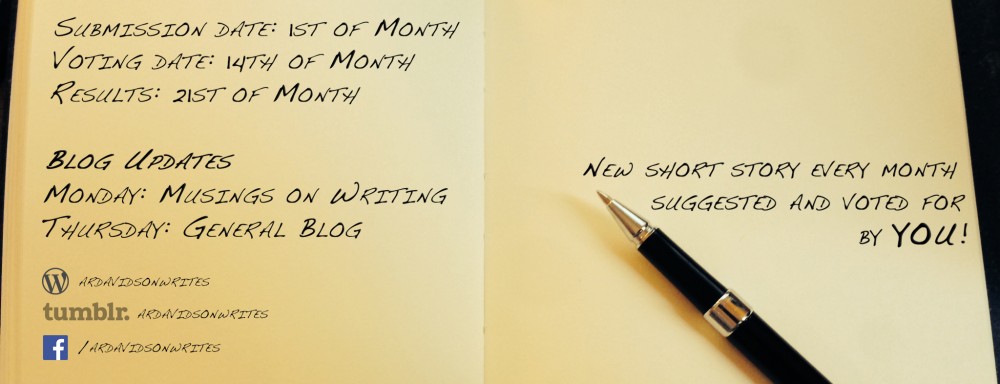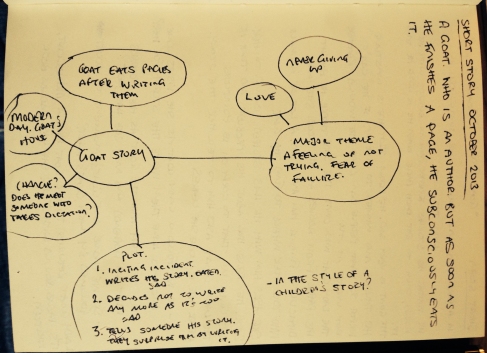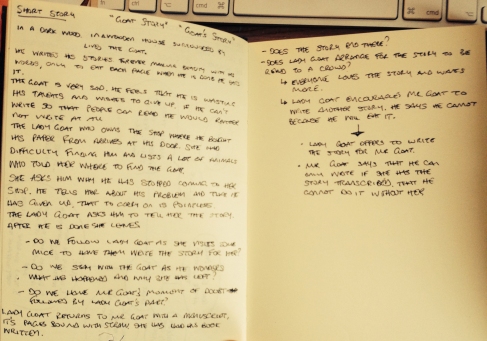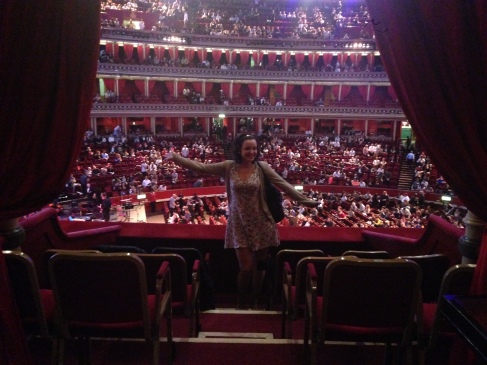Hello,
First up I feel the need to apologise for the terrible quality of the images in this post, since installing Mavericks my scanner no longer works, and no amount of searching has yet found a suitable (read: free) work around for this, so the images are taken with my phone. Yeesh.
I wanted to use this post to talk about the short story that I published on Tuesday and how it came about. I also spoke briefly on Monday about a writing exercise that I find helpful.
In the image above you can see a breakdown of the story. I will talk you round how I map out and plan the story.
Starting with the left hand bubble in the centre we have the Title of the story. This can be temporary, but it does help to start by naming your story.
Directly above that is the Subject of the story. This isn’t a detail of the plot, but a quick summation of the story. This is helpful if you feel you have a block in your writing, remind yourself what you are writing about, is what you are trying to write in service of that? Mine is simply: Goat eats pages after writing them.
The next bubble anti-clockwise is the Setting. Where and when is it set? I’d originally planned for the book to all take place from Mr. Goat’s house, but eventually moved the final scene to be elsewhere. Yours could be in the future, the past, on an alien planet…
Next left is What Changes. My story is about a goat who eats his writing when he finishes it, so the change I wanted was that he meets someone who can help him fulfil his wish to write. Your character is destined to be a different person when the story concludes, whether for the better or worse. What is it that happens to them?
At the bottom is Plot. This you must breakdown into three parts: 1. Inciting Incident – what happens that sets our story in motion? For my story, Mr. Goat eats his work and this makes him sad. 2. Complicit – How do they react to this and what actions do they take? Their involvement allows for the rest of the story to unfold. If Mr. Goat chose to carry on eating his work, it wouldn’t make for a story. He chooses to abandon his writing, breaks his routines and sets in motion the involvement of Nanny Goat. 3. Climax – I’ve spoken about endings before, here it is again, how will the story end? I wrote “Tells someone his story. They surprise him by writing it.”
Connected to the Title is the Major Theme that in the instance of Goat’s Story was of not trying something for a fear of failure. In this case as a metaphor for love, which you can see above as a Minor Theme. You can have as many minor themes as you need. Again they are good to come back to if you’re struggling to write, remind yourself what it’s about.
There’s the story mapped out in a very loose terms. There’s no right or wrong way to write this out, perhaps the themes will help dictate the plot, perhaps the plot is what comes first and you explore the themes as texture. It’s a good tool to be able to look at your story at a glance.
A similar exercise to this is regards to character. Start with your main character in the middle and all the bubbles coming out are what he/she Wants. I didn’t do this for Goat’s Story as it was a fairly straight forward piece, but for the book I have a page all about Evin with numerous bubbles coming out which lead to sub-bubbles. You can carry this further by starting a new page with your protagonist in the middle and the first bubbles around are all the secondary characters, from them you state what they want. I’ve got another page like this with Evin’s family, friends, people she’ll meet and the antagonist. You are really looking to explore what makes those characters. There will always be pieces that come out of it that you hadn’t expected, and you will see opportunities to create scenes where those characters either get or are denied the thing that they want.
If you are writing right now and having some trouble with a character and what to do next try one of the character exercises and see what comes from it.
From that basic diagram of the story I tend to move to a more detailed outline of what I want to write. For me it’s usually the major beats of the story in fairly broad strokes and I am constantly writing questions, be it whether the character would or should do something, to giving myself a couple of options for a scene. Below is the two pages for Goat’s Story.
It was at this point (despite the note on the diagram page) that the story organically became in the style of a children’s story. It seemed a logically extension for a metaphorical story as the best children’s stories are metaphors.
I’m never a slave to this outline, but I find that it helps keep me on track. In the novel I have given an entire story that I had planned for Evin to another character, which has slightly derailed the outline, but that story is better where it is now.
I hope you’ve found this interesting. I will post the story breakdowns for each short story after publication, although the posts will not contain as much explanation of the process as this. I was fortunate that the story came quite easily to me on this one, I’m sure there will be a story that won’t be so fortunate.
And next week I will reveal the details of my novel!
– Andrew




